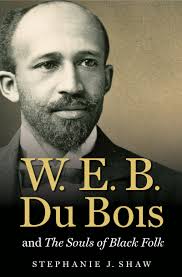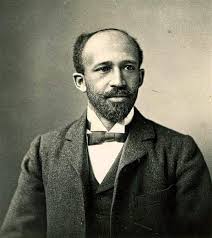The Souls of Black Folk Page #21
The Souls of Black Folk is a 1903 work of American literature by W. E. B. Du Bois. It is a seminal work in the history of sociology and a cornerstone of African-American literature. The book contains several essays on race, some of which the magazine Atlantic Monthly had previously published.
The industrial school springing to notice in this decade, but coming to full recognition in the decade beginning with 1895, was the proffered answer to this combined educational and economic crisis, and an answer of singular wisdom and timeliness. From the very first in nearly all the schools some attention had been given to training in handiwork, but now was this training first raised to a dignity that brought it in direct touch with the South’s magnificent industrial development, and given an emphasis which reminded black folk that before the Temple of Knowledge swing the Gates of Toil. Yet after all they are but gates, and when turning our eyes from the temporary and the contingent in the Negro problem to the broader question of the permanent uplifting and civilization of black men in America, we have a right to inquire, as this enthusiasm for material advancement mounts to its height, if after all the industrial school is the final and sufficient answer in the training of the Negro race; and to ask gently, but in all sincerity, the ever-recurring query of the ages, Is not life more than meat, and the body more than raiment? And men ask this to-day all the more eagerly because of sinister signs in recent educational movements. The tendency is here, born of slavery and quickened to renewed life by the crazy imperialism of the day, to regard human beings as among the material resources of a land to be trained with an eye single to future dividends. Race-prejudices, which keep brown and black men in their “places,” we are coming to regard as useful allies with such a theory, no matter how much they may dull the ambition and sicken the hearts of struggling human beings. And above all, we daily hear that an education that encourages aspiration, that sets the loftiest of ideals and seeks as an end culture and character rather than bread-winning, is the privilege of white men and the danger and delusion of black. Especially has criticism been directed against the former educational efforts to aid the Negro. In the four periods I have mentioned, we find first, boundless, planless enthusiasm and sacrifice; then the preparation of teachers for a vast public-school system; then the launching and expansion of that school system amid increasing difficulties; and finally the training of workmen for the new and growing industries. This development has been sharply ridiculed as a logical anomaly and flat reversal of nature. Soothly we have been told that first industrial and manual training should have taught the Negro to work, then simple schools should have taught him to read and write, and finally, after years, high and normal schools could have completed the system, as intelligence and wealth demanded. That a system logically so complete was historically impossible, it needs but a little thought to prove. Progress in human affairs is more often a pull than a push, a surging forward of the exceptional man, and the lifting of his duller brethren slowly and painfully to his vantage-ground. Thus it was no accident that gave birth to universities centuries before the common schools, that made fair Harvard the first flower of our wilderness. So in the South: the mass of the freedmen at the end of the war lacked the intelligence so necessary to modern workingmen. They must first have the common school to teach them to read, write, and cipher; and they must have higher schools to teach teachers for the common schools. The white teachers who flocked South went to establish such a common-school system. Few held the idea of founding colleges; most of them at first would have laughed at the idea. But they faced, as all men since them have faced, that central paradox of the South,—the social separation of the races. At that time it was the sudden volcanic rupture of nearly all relations between black and white, in work and government and family life. Since then a new adjustment of relations in economic and political affairs has grown up,—an adjustment subtle and difficult to grasp, yet singularly ingenious, which leaves still that frightful chasm at the color-line across which men pass at their peril. Thus, then and now, there stand in the South two separate worlds; and separate not simply in the higher realms of social intercourse, but also in church and school, on railway and street-car, in hotels and theatres, in streets and city sections, in books and newspapers, in asylums and jails, in hospitals and graveyards. There is still enough of contact for large economic and group cooperation, but the separation is so thorough and deep that it absolutely precludes for the present between the races anything like that sympathetic and effective group-training and leadership of the one by the other, such as the American Negro and all backward peoples must have for effectual progress. This the missionaries of ’68 soon saw; and if effective industrial and trade schools were impracticable before the establishment of a common-school system, just as certainly no adequate common schools could be founded until there were teachers to teach them. Southern whites would not teach them; Northern whites in sufficient numbers could not be had. If the Negro was to learn, he must teach himself, and the most effective help that could be given him was the establishment of schools to train Negro teachers. This conclusion was slowly but surely reached by every student of the situation until simultaneously, in widely separated regions, without consultation or systematic plan, there arose a series of institutions designed to furnish teachers for the untaught. Above the sneers of critics at the obvious defects of this procedure must ever stand its one crushing rejoinder: in a single generation they put thirty thousand black teachers in the South; they wiped out the illiteracy of the majority of the black people of the land, and they made Tuskegee possible.
Translation
Translate and read this book in other languages:
Select another language:
- - Select -
- 简体中文 (Chinese - Simplified)
- 繁體中文 (Chinese - Traditional)
- Español (Spanish)
- Esperanto (Esperanto)
- 日本語 (Japanese)
- Português (Portuguese)
- Deutsch (German)
- العربية (Arabic)
- Français (French)
- Русский (Russian)
- ಕನ್ನಡ (Kannada)
- 한국어 (Korean)
- עברית (Hebrew)
- Gaeilge (Irish)
- Українська (Ukrainian)
- اردو (Urdu)
- Magyar (Hungarian)
- मानक हिन्दी (Hindi)
- Indonesia (Indonesian)
- Italiano (Italian)
- தமிழ் (Tamil)
- Türkçe (Turkish)
- తెలుగు (Telugu)
- ภาษาไทย (Thai)
- Tiếng Việt (Vietnamese)
- Čeština (Czech)
- Polski (Polish)
- Bahasa Indonesia (Indonesian)
- Românește (Romanian)
- Nederlands (Dutch)
- Ελληνικά (Greek)
- Latinum (Latin)
- Svenska (Swedish)
- Dansk (Danish)
- Suomi (Finnish)
- فارسی (Persian)
- ייִדיש (Yiddish)
- հայերեն (Armenian)
- Norsk (Norwegian)
- English (English)
Citation
Use the citation below to add this book to your bibliography:
Style:MLAChicagoAPA
"The Souls of Black Folk Books." Literature.com. STANDS4 LLC, 2024. Web. 31 Dec. 2024. <https://www.literature.com/book/the_souls_of_black_folk_310>.




Discuss this The Souls of Black Folk book with the community:
Report Comment
We're doing our best to make sure our content is useful, accurate and safe.
If by any chance you spot an inappropriate comment while navigating through our website please use this form to let us know, and we'll take care of it shortly.
Attachment
You need to be logged in to favorite.
Log In